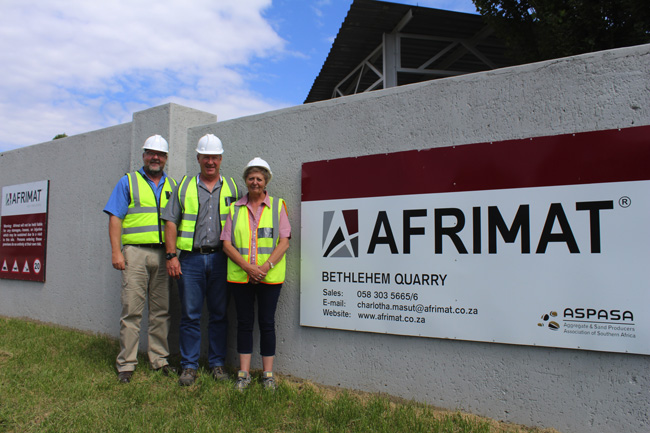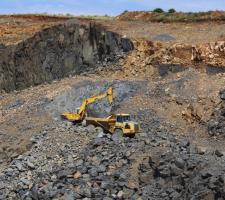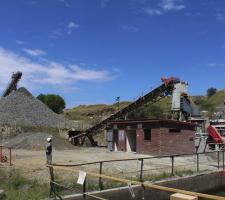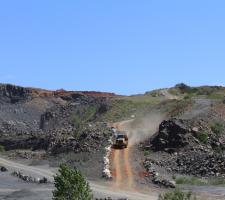
Following Afrimat’s 2016 acquisition of Bethlehem quarry, located in the Free State Province of South Africa, a meticulous turnaround strategy has yielded a significant increase in production, high levels of safety and environmental compliance and an expanded sales reach into both new and old markets. Munesu Shoko reports.
As part of its geographic expansion programme adopted more than a decade ago to transform from being a regional to a national aggregates supplier in South Africa,
Afrimat, a leading South African industrial and construction materials provider, has over the years demonstrated its prowess in corporate revitalisation, exhibited by its approach to acquiring existing businesses in need of a turnaround and making them strong “cash cows” within a short space of time.
The same approach has been well executed at Bethlehem quarry, where a combination of interventions, including plant upgrades, recycling provisions, improved mine planning, new marketing initiatives and streamlined management processes, has notably resulted in a 35% increase in production capacity, high levels of staff morale, higher safety and environmental standards and an increased market reach.
With its large deposit of high-spec dolerite rock, the quarry produces an array of products, namely railway ballast, road and concrete stone (7mm, 10mm, 14mm and 20mm sizes), as well as different sizes of manufactured sands, mostly for brick and block producers, as well as ready-mixed concrete suppliers. Quarry manager Charlotha Masut says railway ballast constitutes about 30% of the total production volumes at this stage, while the different sizes of crusher dust account for 35% and road and concrete stone represents the remaining 35%.
As part of the turnaround strategy, Jaco Cokart, Afrimat’s operations manager – KwaZulu-Natal and Free State, highlights that one of the first initiatives was to embark on a plant upgrade. “When we acquired the operation, the physical condition of the processing plant wasn’t great. We committed a substantial capex (capital expenditure) towards refurbished crushers as well as streamlining the plant layout,” says Cokart, adding that this is an ongoing project.
Haul road optimisation has been another key focus area. “Our haul roads had to adhere to a reworked and improved mine plan,” explains Masut. She reiterates that a common element impacting on every surface mine that uses haul trucks is the construction of haul roads. She is of the view that well-designed haul roads are the lifeline of the operation and will immediately impact on the productivity and/or costs of the quarry. With that in mind, due to the mountainous terrain from the pit to the tipping point at the primary crusher, the haul roads have been designed to allow trucks to go downhill when fully laden, and uphill when empty. This has positively impacted fuel efficiency, productivity through quicker cycle times, as well as safety on site.
Another key focus area since taking over the operation has been the improvement of health and safety standards on site. Afrimat is a member of the Aggregate and Sand Producers Association of Southern Africa (
The About Face programme has guided and aided members, such as Afrimat, from mediocre environmental performance to being among the best quarry operators in the world. “When we acquired the operation, our first environmental audit was really bad. It was one of our key focus areas to get the operation to a high audit mark, and we have since achieved a 40% increase in terms of the Aspasa environmental audit, which is testimony to the team’s hard work in that regard,” explains van Rensburg.
There were several other areas of improvement, which included gate control and security upgrades to make the operation safe, as well as improving community relations. Strong efforts were also made to boost the morale of the 24 staff members on site, and as trivial as this sounds, the intervention has significantly improved productivity, bearing in mind that Afrimat inherited a group of employees with very low morale.
Renewed marketing initiatives have also seen Afrimat expand its market reach in the south and west areas of Bethlehem quarry. “Due to the quality of our dolerite deposit and strong marketing initiatives, we now supply contractors as far as Deneysville (205km) and Senekal (75km). The acquisition also gave us a geographical bridge between our QwaQwa and Harrismith operations,” says van Rensburg.
A combination of these interventions has already paid dividends. A key talking point is the 35% increase in production capacity since taking over the Bethlehem quarry, barely less than two years ago. Other gains include improved community relations, as well as enhanced safety and environmental audit results.
Aggregates Business International recently visited the quarry to learn more about its production processes. The process starts with drilling and blasting, which happens every six to eight weeks, depending on available demand. This function is outsourced to sister company, Afrimat Contracting International.
From here, two
At the tipping point material goes into the primary
At the HP300, ballast material is taken out and the other remaining sizes move onto the 36” Osborn tertiary crusher, where all the dust material is taken out. From the tertiary crusher, material goes through an Oremaster vertical shaft impactor (VSI) which is designed to chip off all the corners to make roundish material for road construction applications. The VSI produces all road and concrete stone sizes, from 7mm and 10mm through to 14mm and 20mm. The material is also washed to meet a high-spec grade.
In terms of demand, Cokart says the operation is enjoying increased demand for its product, with exciting growth potential for the 2019 financial year. He says ballast, road stone and dust material are the operation’s bread and butter at this stage, with demand for these material sizes peaking during the start of the year.
Transnet SOC Ltd, a large South African rail, port and pipeline company, has a strong maintenance programme for its railway lines, hence the increased demand for ballast. “The recent rain season has had an adverse impact on roads and there is also a big focus on road maintenance in the area. We have seen a lot of road projects taking off in that regard,” says Cokart. For example, the Bethlehem quarry has been contracted to supply construction contractor,
Manufactured sand is probably the biggest seller at this stage, with the -10 mm said to be in high demand, driven in particular by block and ready-mixed concrete manufacturers in the area.
“Due to the high demand for our manufactured sands, especially supplied to the brick yards and readymix suppliers, we have a Disk 36” Gyro crusher with a separate screen to re-crush all non-sellable products into manufactured sand,” explains Masut. BHM Bricks, which has established its operations on Afrimat’s Bethlehem quarry site, is one of the biggest recipients of the crusher dust. The operation also reports increased demand for its bricks and blocks, which in turn drives demand for Afrimat’s aggregates.
“In the near future we envisage supplying a lot of water storage projects planned for the area. There is a big focus on dams and water reservoirs to deal with water scarcity. These projects will drive the uptake of our material. We are also looking forward to supplying material to low-cost housing projects planned around the area, and we are confident of achieving sustainable growth this year,” concludes van Rensburg.











